Central African Republic
Voting began on Sunday in the Central African Republic's presidential and legislative elections after a campaign period marked by violence between rebels and government forces.
Despite calls from the opposition to delay the vote amid the insecurity, the Constitutional Court rejected a postponement.
President Faustin-Archange Touadera, seeking a second term, has tried to reassure candidates and voters that the voting will be secure.
This is the central African country's first election since a peace deal was signed between the government and 14 rebel groups in February 2019, although fighting continues.
Three peacekeepers from Burundi were killed and two others wounded Friday by armed combatants.
The U.N. Secretary-General Antonio Guterres condemned the attacks in the Dekoua and Bakouma areas ahead of the elections, calling for swift justice and saying they may constitute war crimes.
The U.N. retook the town of Bambari last week from rebels. Rebel groups have also seized several towns near the capital, Bangui.
#ElectionsRCA : #UN peacekeepers from the #MINUSCA Rwanda Contingent stand guard at the Lycée Boganda voting centre in Bangui as Central Africans go to the polls in the 27 Dec. 2020 general elections pic.twitter.com/yosNfZs7Fu
— MINUSCA (@UN_CAR) December 27, 2020
Voters went to the polls in the capital Sunday, though others had fled the violence over the holiday weekend.
Many residents of the town of Bangassou in the nation's southeast were fleeing because of the fighting, residents said.
``I am in the town of Bangassou but my wife and children crossed to the other side of the bank towards Congo because of the violence,'' said Christian Kombro a teacher from the town.
The government blames the unrest on former President Francois Bozize, who returned from exile a year ago and has been blocked from running in the election. He has been accused of joining up with armed groups to destabilize the country and launch a coup. He has denied it.
Rwanda and Russia have each sent hundreds of troops to the country to support the government.
Sixteen candidates are running for president, including three women. More than 1,500 candidates are running for 140 seats in the national assembly. More than 1.86 million voters are registered, but more than 598,000 refugees in neighboring countries will not be able to vote, according to the U.N.
Parties in the Democratic Opposition Coalition known as COD-2020 last week said seven of its candidates pulled out of the election, citing the violence. The parties had wanted the vote to be delayed, alleging poor preparations and an electoral body influenced by the president.
Experts warn of a strong chance of further violence if the opposition doesn't accept the election results. ``A contested outcome may lead to a post-electoral crisis that armed groups could use to further weaken the state,'' the International Crisis Group noted.
The mineral-rich Central African Republic has faced deadly inter-religious and inter-communal fighting since 2013, when predominantly Muslim Seleka rebels seized power from Bozize after long claiming marginalization. Resistance to Seleka rule eventually led to Muslims being targeted en masse, with some beaten to death, mosques destroyed and tens of thousands forced from the capital in 2014.
#ElectionsRCA : l’unique femme candidate à la présidentielle, Catherine Samba Panza, après avoir voté dans sa circonscription du 7e arrondissement : « c’est un grand jour qui s’inscrit dans la longue lutte de démocratisation et du retour à l’ordre constitutionnel ». pic.twitter.com/nBgRjrqftR
— MINUSCA (@UN_CAR) December 27, 2020
Despite a 2019 peace agreement between the government and 14 rebel groups, intermittent violence and human rights abuses have continued.
The most recent insecurity began after the Constitutional Court rejected the candidacy of Bozize, on the grounds that he did not satisfy the ``good morality'' requirement.
Bozize, who took power in a coup in 2003 and ruled until 2013, faces an international arrest warrant for ``crimes against humanity and incitement of genocide.'' He also faces U.N. sanctions for his alleged role in supporting the anti-Balaka groups that resisted the Seleka in 2013.
AP




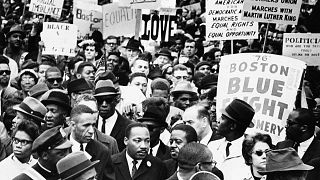
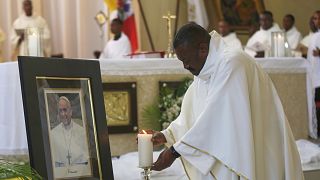
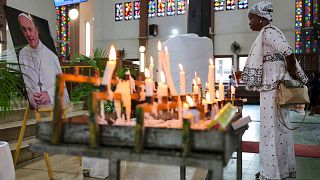
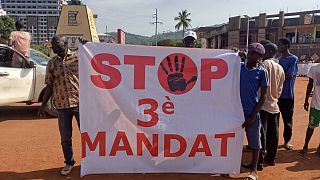
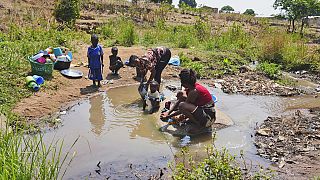
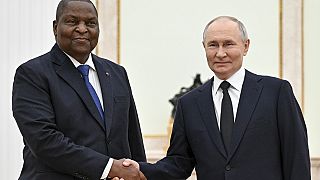
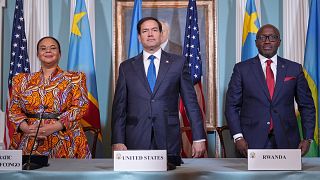
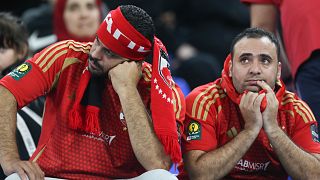
Go to video
Sudan: Rapid Support Forces attack in western Darfur kills at least 30, according to activist group
Go to video
DRC: Goma Christians celebrate Easter under rebel rule
Go to video
Congo suspends Kabila's political party over rebel 'ties'
01:06
Sudan: Thousands flee, more remain trapped in RSF attack on Darfur camp
Go to video
South Sudan: top UN official in the country warns of risk of new civil war
Go to video
Sudan: Rapid Support Forces leader announces rival government